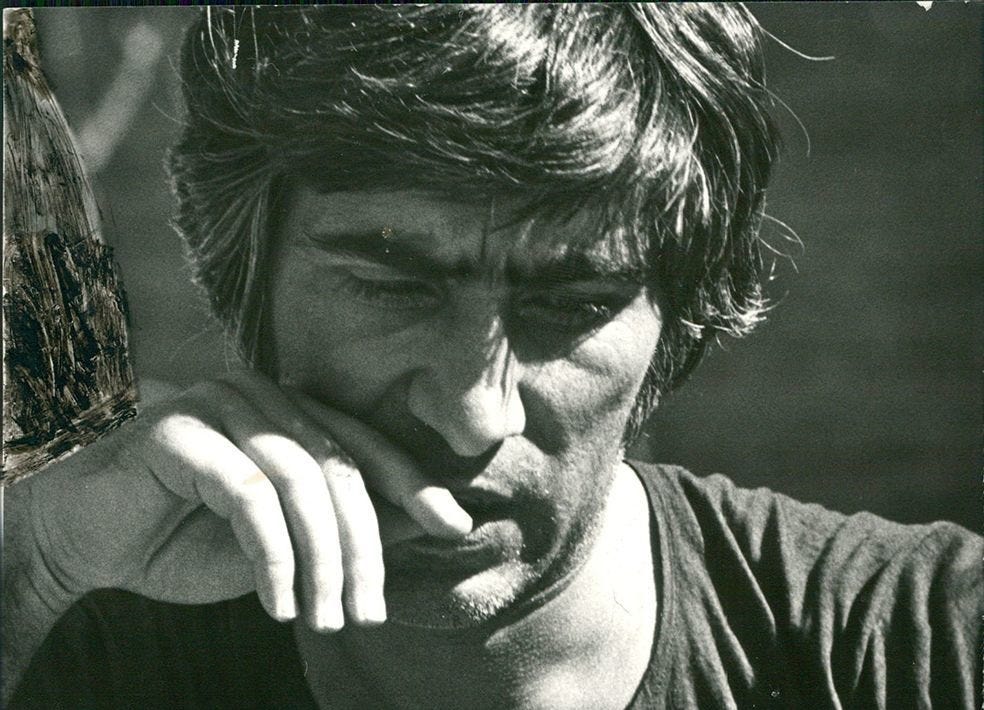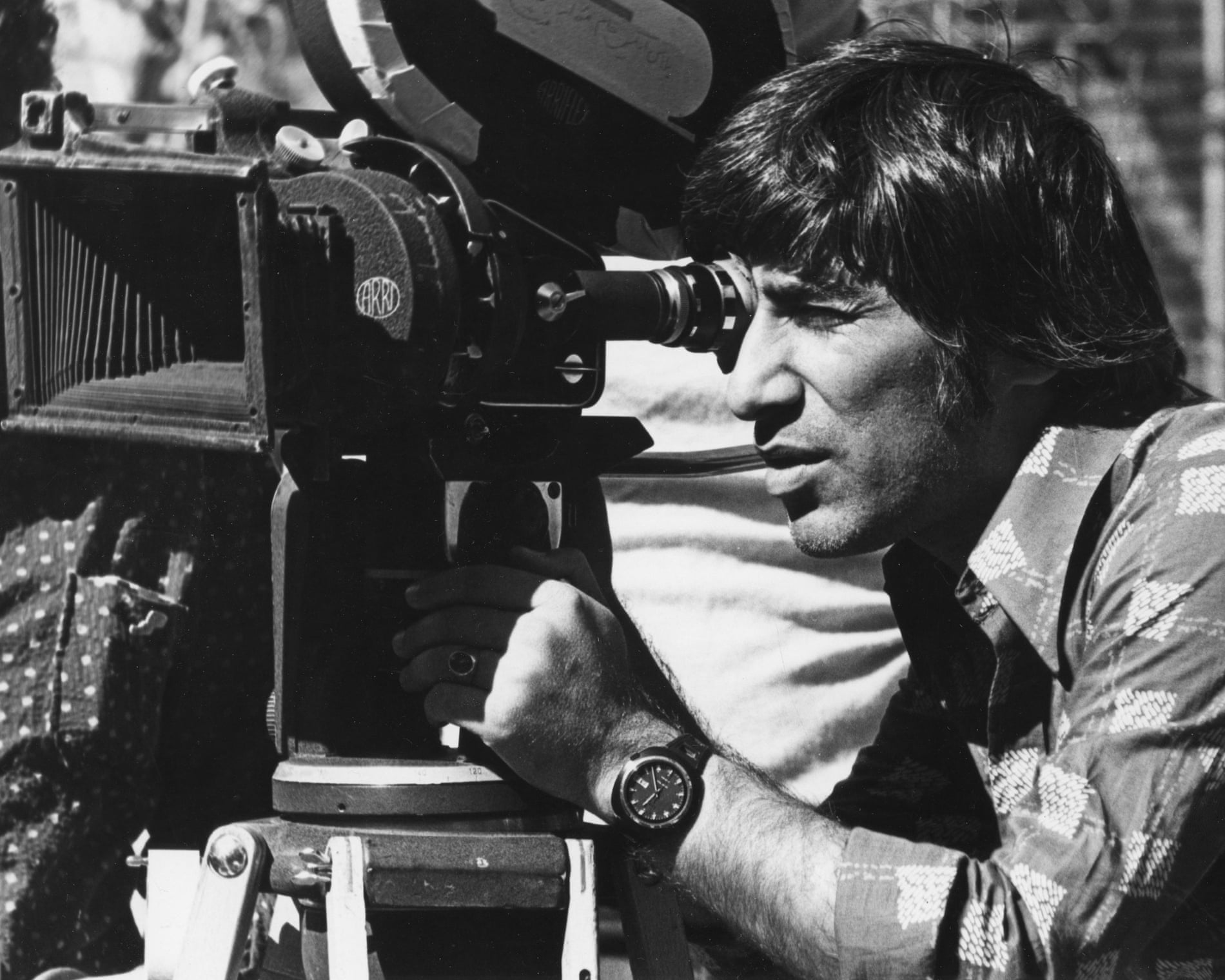My Guardian obituary on the late, great Bahram Beyzaie can be read here.
Monday, 29 December 2025
Saturday, 27 December 2025
RIP Bahram Beyzaie (1938-2025)
 |
| Bahram Beyzaie |
One of the guiding lights of Iranian modernist cinema since 1969, and an equally invaluable force in theater, literature, and history, Bahram Beyzaie passed away yesterday in California, where he had been based for the past 15 years.
For public screenings of his films, I have previously reviewed at least five of his works, which I share again here in memory of one of Iranian cinema’s most brilliant figures.
Ragbar [Downpour] (1972)
Safar [Journey] (1972)
Gharibeh va Meh [The Stranger and the Fog] (1974)
Kalagh [Crow aka Raven] (1977)
Cherike-ye Tara [The Ballad of Tara] (1979)
Ragbar [Downpour] (Bahram Beyzaie, 1972)
In this, one of the most accessible and beloved Iranian New Wave films, a young teacher is sent to a school in the impoverished south end of Tehran, where he falls in love with his student’s elder sister, and directs all his energy into helping the students put on a stage show. Moving, witty, and brilliantly directed in an energetic and unusual combination of neorealism and political symbolism, Bahram Beyzaie’s first feature was realized with a shoestring budget but managed with astounding success to blend its director’s roots in theater, literature, and film history with a story that, even to this day, resonates powerfully with Iranians. — EK
Monday, 28 July 2025
Kalagh [The Crow] (Bahram Beyzaie, 1977)
From the new issue of Sight and Sound (September 2025), dedicated to "More Hidden Gems", here's my pick for a hidden gem that deserves to be restored and revived. – EK
Tuesday, 3 June 2025
Safar (Bahram Beyzaie, 1972)
%20(c)%20Kanoon_da%20Mk2%20(3).jpg) |
| Safar |
Written for the world premiere of the brand new restoration (from the camera negative) at Il Cinema Ritrovato 2025. – EK
A 12-year-old orphan with a habit of seeking out his potential parents takes his friend along on a journey through the wastelands on the outskirts of Tehran. Seemingly a children’s folk tale, Safar is so visually singular that it evades easy breakdown. It is allegorical, but allegory is the engine; visual density the result.
Saturday, 2 November 2024
Cinema is a Machine of Empathy
.jpg) |
| The Stranger and the Fog |
“CINEMA IS A MACHINE OF EMPATHY”: RESTORING AND CURATING IRANIAN’S CINEMATIC HERITAGE.
An interview with Ehsan Khoshbakht
By André Habib (Université de Montréal)
The international recognition of Iranian cinema parallels its presence on the world festival circuit, from Gaffari’s 1963 Night of the Hunchback, through Kiarostami’s Palme d’or for The Taste of Cherry to Rossoulof’s in extremis addition to the 2024 Cannes Festival selection. These last few years, festivals (in particular Cannes, Venice, Berlin, Locarno) have been pivotal in diagnosing the “state of affairs” in the Islamic Republic of Iran, the ongoing creative struggle and resistance filmmakers have opposed to the regime. We could also add that, over the past ten years, it is also via festivals, and particularly those specialized in showcasing film restorations, that we have witnessed a reappraisal and renewed appreciation for works, mostly shot before the revolution, that had fallen into relative oblivion and which all, in some respect, display eloquent forms of politic and poetic resistance. It is safe to say that nowhere is this truer than at the Cineteca di Bologna, via its now world-renowned Cinema Ritrovato festival and through the work of the Immagine ritrovata laboratory. Crucial to this new wave of rediscoveries is Ehsan Khoshbakht, who has, since 2018, worked as co-director of the Cinema Ritrovato festival, apart from curating many ambitious programs across the world (notably, recently, the October 13th to November 27th MoMA program, Iranian Cinema Before the Revolution, spanning fifty years and presenting close to 70 feature and short films). He is also a filmmaker, an architect and an essential figure, with others, of the contemporary reassessment of the importance and richness of the history of Iranian cinema. Shortly before the launch of the Fall of 2023 MoMA cycle, we had a chance to interview him for this special issue of Regards.
Wednesday, 16 October 2024
The Stranger and the Fog (Bahram Beyzaie, 1974)
.jpg) |
| Bahram Beyzaie on the set of The Stranger and the Fog |
Impossible to see for decades, Bahram Beyzaie's dazzling The Stranger and the Fog, about a mysterious stranger arriving in a drifting boat to a coastal village and falling for a woman, is an endlessly symbolic tale in which ghosts of the past, narrow-minded villagers and forces beyond the controls of the characters take the viewer into a dizzying labyrinth of rituals. In the film's meticulously structured circular narrative, characters, times and spaces rhyme and mirror each other, turning filmmaking into an act of dreaming. Characters are the product of each other's imagination before turning into myth. The film gives the centre of both attention/desire and control to a woman of will therefore it goes beyond the confines of the victimised women of the 1970s Iranian cinema.
Monday, 5 June 2023
Peter Cowie on Gharibeh va Meh (1974)
"Two years in the making, it is a vast, symbolist drama, set in some remote historical period (hazy even to Iranians), and bursting at the seams with action and bloodcurdling confrontations. Why a young man arrives in a boat to disturb the ritual of a small village, why he is pursued by a band of ominous, black-clad strangers, and why he takes once more to the sea, seems unimportant, for Beizai’s [sic] dazzling technique, clearly influenced by Kurosawa, sweeps all before it. No other Middle Eastern cinema could sustain such an ambitious and visually exciting production." Peter Cowie / Sight & Sound, April 1975
Tuesday, 30 May 2023
Cherike-ye Tara [The Ballad of Tara] (Bahram Beyzaie, 1979)
.jpg) |
| The Ballad of Tara |
Bahram Beyzaie's seamless blend of myth, symbolism, folklore and classical Persian literature in The Ballad of Tara is unparalleled in its complexity. Yet, apart from Downpour (1972), which was restored and revived a decade ago, the director with the most consistent body of work in the Iranian cinema of the 1970s is also, unjustly, one of the most invisible masters of the Iranian New Wave. Here, as well as directing, he has also produced, written, set-, costume-designed and edited a mesmerising tale that fuses the ceremonial legends of the past with contemporary life. Tara, a strong-willed widow encounters the fleeting ghost of an ancient warrior in the forest next to her village. The ghost's appearances become more frequent and finally he talks to her, claiming a sword that she has found among her father's effects. Without the sword, the dead warrior can't rest. But when the sword is restored to him, it's his love for Tara that prevents him from returning to the land of the dead.



.jpg)
